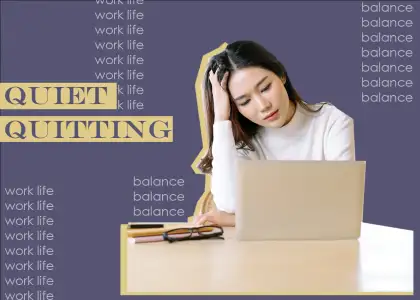Quiet Quitting: Refusing Hustle Culture and the Grind

It was only in the recent past when neon signs of "Hustle Harder" earnestly adorned the walls of coworking spaces and offices, and similar-sounding mantras like "Keep Calm and Grind On" and "Rise and Grind" festooned shirts, water tumblers, and laptop stickers.
Many, surely, accepted these generic statements with a serious nod and self-promise to commit to working "harder" at one point. Today, though, it's difficult to take such faux gospel seriously and unironically.
It isn't so much that workers no longer give a damn. It's just that the compounded weariness of selling the hours of one's life for labour has workers refusing to slave away for capital alone any longer. As it turns out, money really isn't everything (who knew?) and that hustle and grind culture is 1). unsustainable and 2). a womb-to-tomb trap all along.
The hustle ethos promised us advancement: hustle harder and you'll have more money, hustle so you can get a bigger promotion, hustle if you want to be on top — it was a bottomless void that demanded to be filled. Number of hours worked was a badge of honor and working oneself to death deemed vogue, if not noble. If your every second is not optimised or productivised, and every minute not Pomodoro-ed, are you really making something of yourself? This notion seems to enable exactly the kind of system that glorifies overwork where productivity equals human value and success, and success equals ascent in a profit-driven structure where humans are dispensable. It does not make humanistic sense.
Its context rooted in the realities and struggles of Black people, hustle — according to NPR on April 3, 2022 — has been co-opted in recent years to pertain to "an empowering, even lucrative project that someone, often a white person with means, takes on outside of their 'day job.'"
Hustle, around the late 19th century and early 20th century, had negative connotations that usually pertained to illegal activities such as sex work and stealing, the report added, and was "invoked to make an association between blackness and laziness." Yet despite coming from a context of survival, the "side hustle" or gig seemed to have been appropriated into an ethos and track of your quintessential finance and crypto bros, girlbosses, and startup founders to accelerate their careers and stay ahead of “the game.”
The Phenomenon of Quiet Quitting
Recently, a phenomenon has emerged amid the pandemic. Quiet quitting, which made the rounds on the internet in the past couple of weeks, does not pertain to the actual act of quitting one's job but the refusal of the “work is life” attitude.
TikTok users gave their own takes about what quiet quitting meant to them. For example, user @zaidleppelin posted on July 26, 2022, a voiceover video where he explained that quiet quitting is renouncing the idea of "going above and beyond."
"You're still performing your duties but you're no longer subscribing to the hustle culture mentality that work has to be your life. The reality is it's not and your worth as a person is not defined by your labour," he said.
Meanwhile, TikTok user @claytonfarris4ever, said in a video posted Aug. 18 that quiet quitting is about workers reclaiming the hours of their lives.
"Workers are taking back their time, their extra time and their mental space, to allow for more than just work in their life. But there's a misconception that's already happening amongst the traditional old guard, they're saying that quiet quitters are lazy or don't have goals or are not high achievers. That's not true," he said.
"When you quietly quit, you can still have goals and still be a high achiever, but you don't have to stress yourself out and give up all the other joys of life and only focus on work to get where you want to go. Quiet quitting is empowering and rewarding."
Quit quitting, thus, is an active protest. It is the quitting of a mentality and act that one must enslave oneself at work and call this living — no matter how empowering Beyoncé may make it sound when she sings about stacking paper and cake, grinding from Monday to Friday, and working from Friday to Sunday.
Dr. Maria Kordowicz, an associate professor in organisational behaviour at the University of Nottingham, said in a GQ interview on Aug. 17, 2022, that this phenomenon is a "conscious effort" of employees to preserve their welfare at work versus "risk[ing] burnout through working long hours or defining ourselves simply through our work."
Just when we thought working from home during the COVID-19 pandemic could spell work-life balance for us, the health crisis instead seemed to have brought on a surge in burnout among workers. In fact, a wave of workers quit their jobs amid the pandemic in what is now called "The Great Resignation," as termed by organisational psychologist and Texas A&M University professor Anthony Klotz, with 4.5 million workers in the United States leaving their jobs in November 2021, as per CNBC on Jan. 14, 2022.
As working hours became blurred, and "work" and "life" now under one roof, it became challenging to divorce the two, if there's a separation at all. In fact, according to the American Psychological Association (APA) on Jan. 1, heightened rates of burnout were observed in 2021, as in 2020, with nearly three in five employees experiencing lack of interest and motivation, lack of effort at work, cognitive weariness, emotional exhaustion, and physical fatigue.
It’s hazy when exactly these COVID-19-related stressors would cease, though WHO Director-General Tedros Adhanom Ghebreyesus told media on Sept. 14 that "the end is in sight” for the pandemic.
The elephant in the room, though, is that the reduction of these stressors falls into the hands of employers. Christian Maslach, psychology professor emerita at the University of California, Berkeley, said via APA that employers should focus on "maintaining balance, taking things off the plate when they add something new."
Employers, thus, must reckon with the reality that quiet quitting is not a “you problem,” an isolated case, nor some passing trend. It is the consequence of a much larger systemic issue at hand that requires genuine changes at the structural and cultural level of organisations. Until this is possible, quiet quitting is not going anywhere.
Subscribe to The Beat's newsletter to receive compelling, curated content straight to your inbox! You can also create an account with us for free to start bookmarking articles for later reading.






















































